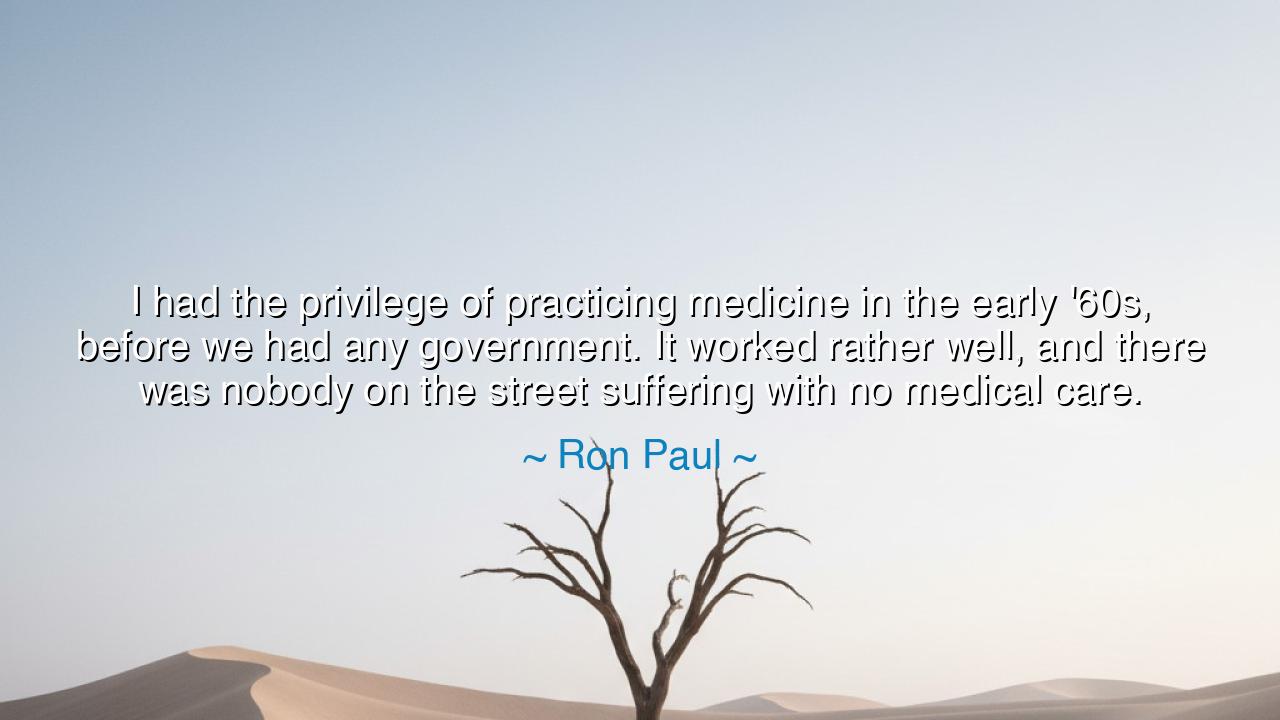
I had the privilege of practicing medicine in the early '60s
I had the privilege of practicing medicine in the early '60s, before we had any government. It worked rather well, and there was nobody on the street suffering with no medical care.






Hear then the words of Ron Paul, physician and statesman, who once spoke of his days in the healing arts: “I had the privilege of practicing medicine in the early '60s, before we had any government. It worked rather well, and there was nobody on the street suffering with no medical care.” In these words there lies not merely a memory of a doctor’s craft, but a vision of a time when the bonds between healer and patient were unburdened by the chains of bureaucracy. He recalls a world where the duty to care flowed not from decrees or regulations, but from the sacred trust between one human and another.
To understand his utterance, one must see the essence of what he means: medicine as service, unmediated by the state. In those days, doctors often received a chicken, a loaf of bread, or a simple handshake in place of coins. And yet, the sick were not abandoned. Why? Because the physician knew his art was not his possession alone—it was a gift to be shared. There was dignity in the giving and dignity in the receiving. In Ron Paul’s memory lives the truth that healing is not merely a transaction but a covenant of compassion.
Consider the tale of Dr. Tom Dooley, the young physician who left behind comfort in America to bring medicine to the villages of Laos in the 1950s. He did not wait for governments or policies to ordain his path. Instead, he brought his hands, his skill, and his heart. He treated the sick beneath bamboo roofs, using what tools he had. His life echoes the spirit of Ron Paul’s words—that care can spring forth from conscience and love, even without the machinery of state. In such moments, humanity itself is the great physician.
Yet we must not be blind to the shadows. For though Ron Paul speaks of a time when no one was left suffering on the street, others recall differently: the poor, the marginalized, and the forgotten often struggled in silence. His words, then, are less a declaration of perfection, and more a lament for a lost intimacy between healer and patient. Where once trust was direct, now forms, codes, and costs stand in between. The lesson is not to turn back blindly, but to rediscover the ancient spirit of medicine as love made visible.
The meaning, then, is twofold: first, that freedom in the practice of care allows creativity, generosity, and humanity to flourish. Second, that without vigilance, systems meant to bring order can stifle the very compassion they were born to protect. True healing arises not from statutes alone, but from the heart of the healer and the trust of the community.
Therefore, let this wisdom guide you: never surrender the care of the weak to rules alone, nor imagine that laws can replace love. Let each of us, in our measure, be physicians of the soul—offering kindness, listening to pain, and lifting burdens, whether or not it is written in law. For the strength of a society is not measured in its codes, but in its mercy.
To live by this teaching, practice generosity where you stand. Support your neighbors before you call upon distant powers. Honor those who bring healing not because they are commanded, but because they are devoted. And if you find yourself in a position to serve, do so with the humility of the ancients, remembering that true medicine is not confined to hospitals—it is the daily act of tending to another’s need.
Thus the words of Ron Paul echo across time: a reminder that while governments may build systems, it is human compassion that sustains life. May you carry this torch forward, binding wounds not only of flesh but of spirit, and restoring in every age the covenant of care between one soul and another.






AAdministratorAdministrator
Welcome, honored guests. Please leave a comment, we will respond soon